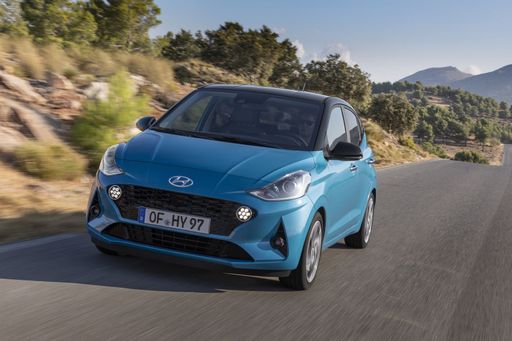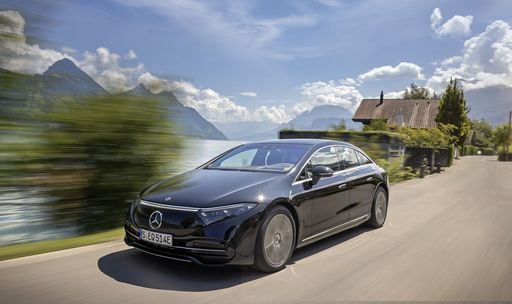Hyundai i10 VS Mercedes-Benz EQS
Hyundai i10
The Hyundai i10 impresses with its compact design, making it an ideal choice for navigating through busy urban environments. Its interior is surprisingly spacious, offering drivers and passengers comfort beyond what one might expect from a city car. The model combines efficiency and practicality, making it an attractive option for those seeking both economy and functionality in their daily commute.
more informationMercedes-Benz EQS
The Mercedes-Benz EQS redefines luxury in the realm of electric vehicles, combining exceptional comfort with cutting-edge technology. Its sleek and aerodynamic design is a testament to both elegance and efficiency, setting new standards for the brand. Inside, the EQS offers a serene and spacious cabin equipped with the latest advancements, ensuring a refined driving experience.
more informationHyundai i10
Mercedes-Benz EQS

|

|
| from price from £14,600 | from price from £93,900 |
General |
|
|---|---|
|
Model Year
2024
|
Model Year
2024
|
|
CO2 Efficiency Class
C, D
|
CO2 Efficiency Class
A
|
|
Trim Level
Select, N Line, Trend, Trend Automatik, Prime, Prime Automatik
|
Trim Level
AMG Line 4MATIC, Electric Art 4MATIC, AMG Line, Electric Art, 4MATIC+, DYNAMIC PLUS Paket 4MATIC+
|
|
Brand
Hyundai
|
Brand
Mercedes-Benz
|
Costs and Consumption |
|
|
Price
14600 - 19000
£
|
Price
93900 - 136900
£
|
|
Verbrauch L/100km
4.9 - 5.4
L
|
Verbrauch L/100km
-
|
|
Verbrauch kWh/100km
-
|
Verbrauch kWh/100km
16.5 - 21
kWh
|
|
Electric Range
-
|
Electric Range
625 - 816
km
|
|
Battery Capacity
-
|
Battery Capacity
118
kWh
|
|
Monthly Costs
694 - 793
£
|
Monthly Costs
2117 - 2827
£
|
|
Cost per Km
27.8 - 31.8
ct
|
Cost per Km
84.7 - 113.1
ct
|
|
co2
111 - 123
g/km
|
co2
0
g/km
|
|
Fuel tank capacity
36
L
|
Fuel tank capacity
-
|
Dimensions and Body |
|
|
Body Type
Hatchback
|
Body Type
Hatchback
|
|
Seats
4 - 5
|
Seats
5
|
|
Doors
5
|
Doors
5
|
|
Curb weight
996 - 1099
kg
|
Curb weight
2545 - 2715
kg
|
|
Trunk (boot) capacity
252
L
|
Trunk (boot) capacity
610
L
|
|
Length
3670 - 3675
mm
|
Length
5223
mm
|
|
Width
1680
mm
|
Width
1926
mm
|
|
Height
1480 - 1483
mm
|
Height
1512 - 1520
mm
|
|
Payload
344 - 423
kg
|
Payload
510 - 565
kg
|
Engine and Performance |
|
|
Engine Type
Petrol
|
Engine Type
Electric
|
|
Fuel Type
Super
|
Fuel Type
Electricity
|
|
Transmission
Manual, Automatic
|
Transmission
Automatic
|
|
Transmission Detail
Manual Gearbox, Automated Manual Transmission
|
Transmission Detail
Reduction Gearbox
|
|
Drive Type
Front-Wheel Drive
|
Drive Type
All-Wheel Drive, Rear-Wheel Drive
|
|
Horsepower (HP)
63 - 90
HP
|
Horsepower (HP)
360 - 761
HP
|
|
Acceleration 0-100km/h
11.4 - 18.4
s
|
Acceleration 0-100km/h
3.4 - 6.2
s
|
|
Max Speed
143 - 175
km/h
|
Max Speed
210 - 250
km/h
|
|
Torque
93 - 172
Nm
|
Torque
568 - 1020
Nm
|
|
Number of Cylinders
3 - 4
|
Number of Cylinders
-
|
|
Power (kW)
46 - 66
kW
|
Power (kW)
265 - 560
kW
|
|
Engine capacity
998 - 1197
cm3
|
Engine capacity
-
|
|
Top speed
143 - 175
km/h
|
Top speed
210 - 250
km/h
|
Hyundai i10
Introduction to the Hyundai i10
The Hyundai i10 has consistently proven to be a dependable and stylish companion for urban driving. Known for its compact design and efficiency, this hatchback offers a perfect blend of modern aesthetics and practicality, making it a popular choice for city dwellers and small families alike.
Performance and Efficiency
The Hyundai i10 is available with both manual and automatic transmissions, catering to various driving preferences. Engine power ranges from 63 to 90 PS, providing a versatile driving experience for both novice and seasoned drivers. The fuel consumption varies between an impressive 4.9 to 5.4 litres per 100 kilometres, fitting for those looking to minimise fuel costs while also reducing their carbon footprint.
Engine and Transmission
Equipped with a choice of 1.0-litre or 1.2-litre engines, the i10 offers up to 172 Nm of torque, ensuring lively performance. The models feature front-wheel-drive configurations, allowing for smooth handling and reliable road performance. The car excels in city driving but is equally capable on longer journeys.
Interior and Comfort
Despite its compact size, the Hyundai i10 does not compromise on interior space and comfort. It accommodates four to five occupants comfortably, offering sufficient legroom and headroom. Its flexible seating arrangement and a 252-litre boot make it ideal for both quick trips and weekend getaways.
Safety and Technology
Safety remains a priority with Hyundai, and the i10 is no exception. It comes equipped with multiple airbags, stability control, and advanced braking systems. Technology-wise, the i10 features a user-friendly infotainment system with smartphone connectivity, ensuring a pleasant and connected drive.
Design and Style
The Hyundai i10’s design is both modern and sleek, making it stand out in the compact hatchback segment. With a length ranging from 3670 to 3675 mm, a width of 1680 mm, and a height of 1480 to 1483 mm, the i10 strikes a perfect balance between style and functionality.
Affordable Pricing and Value
The i10 is available in several trims including the Select, N Line, and Prime, among others, with prices ranging from €16,990 to €22,190. Considering its features and low running costs — with monthly expenses estimated between €694 to €793 — the Hyundai i10 offers substantial value for those seeking an economical yet stylish hatchback.
Conclusion
The Hyundai i10 combines efficiency, modern design, and practicality in a compact package. Whether you are seeking a reliable city car or an economical daily driver, the Hyundai i10 is a strong contender worth considering in the compact car market of 2024.
Mercedes-Benz EQS
Revolutionising Electric Mobility: The Mercedes-Benz EQS
The automobile industry is undergoing a remarkable transformation, and at the forefront of this evolution is the Mercedes-Benz EQS. As a flagship model of the German marque's electric lineup, the EQS represents the pinnacle of luxury and innovation in the sphere of electric vehicles (EVs). With its sleek silhouette, unparalleled technology, and sustainable power, the EQS promises to set new standards for luxury electric driving.
Elegant Design Meets Intelligent Engineering
The Mercedes-Benz EQS is designed with an aesthetic that reflects both futuristic vision and traditional elegance. Its elongated body, measuring 5,223 mm in length, conveys a powerful presence on the road while ensuring optimal aerodynamics. The front fascia, with its innovative LED lighting design, provides a distinctive visual signature whether the car is in motion or stationary.
Additionally, the EQS features a spacious boot with a capacity of 610 litres, ensuring practicality is not sacrificed for style. Attention to detail is evident everywhere, from the 1,926 mm wide stance that provides stability and poise to the exquisite interior craftsmanship that creates an atmosphere of refined luxury.
A Masterclass in Performance and Efficiency
Underneath its elegant exterior, the Mercedes-Benz EQS houses some of the most advanced technological innovations. It boasts an electric powertrain with a range of power outputs from 360 PS to an impressive 761 PS, thanks to its sophisticated dual-motor setup. With a maximum speed ranging between 210 and 250 km/h, the EQS ensures that electric mobility does not compromise on performance.
Efficiency is also a key player with the EQS. The model achieves an impressive energy consumption rate starting from 16.5 kWh per 100 km, empowering drivers with an electric range extending up to 816 km on a single charge. This is made possible by the vehicle’s substantial 118 kWh battery capacity, paired with advanced energy recuperation systems.
Setting New Standards for Technological Innovation
The EQS is not just about what's under the bonnet; it’s also about the cutting-edge technology that enhances every driving experience. The revolutionary MBUX Hyperscreen is a standout feature, extending across the dashboard with a seamless blend of screens, providing unparalleled interactive experiences and information at the driver's fingertips.
Safety and driver assistance are paramount, with features such as the latest generation of driving aids, ensuring both safety and convenience. The EQS is equipped with numerous sensors and AI-driven systems that effortlessly adapt to road conditions and driver behaviour, providing support and confidence in every journey.
Environmental Commitment and Cost Efficiency
With zero CO2 emissions on the road, the EQS is emblematic of Mercedes-Benz’s commitment to sustainable and environmentally friendly mobility. Furthermore, the cost-effectiveness of operating an EQS is another attractive feature, with ownership costs ranging from €2,117 to €2,827 per month, depending on the driving style and specific configuration. The EQS is not only setting a benchmark in luxury and innovation but also paving the way for a greener future.
Conclusion: The Future is Electric
The Mercedes-Benz EQS stands as a testament to the future of the automotive industry. It combines sustainability with luxurious comfort, cutting-edge technology with outstanding performance. For those seeking to make a statement and lead the charge towards an electrified motoring future, the EQS offers an unparalleled experience that is as innovative as it is inspiring.
